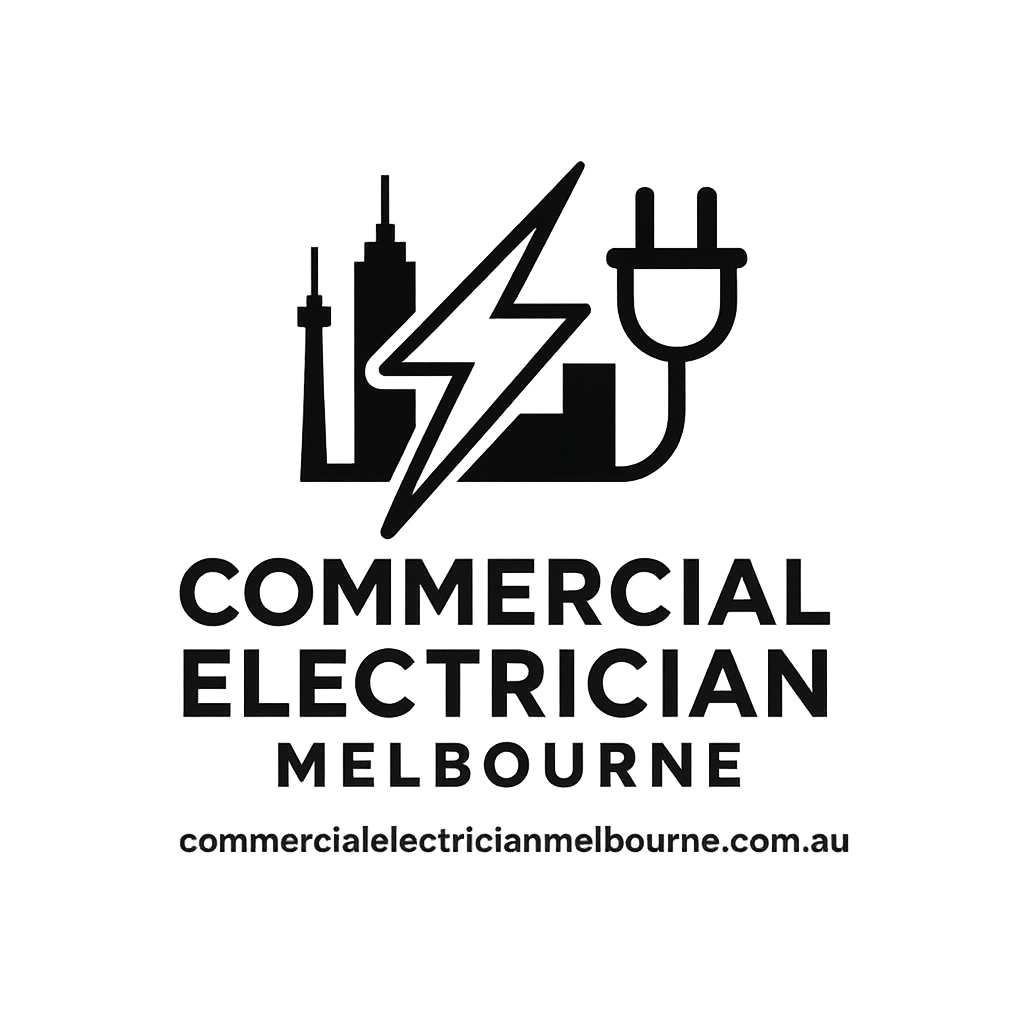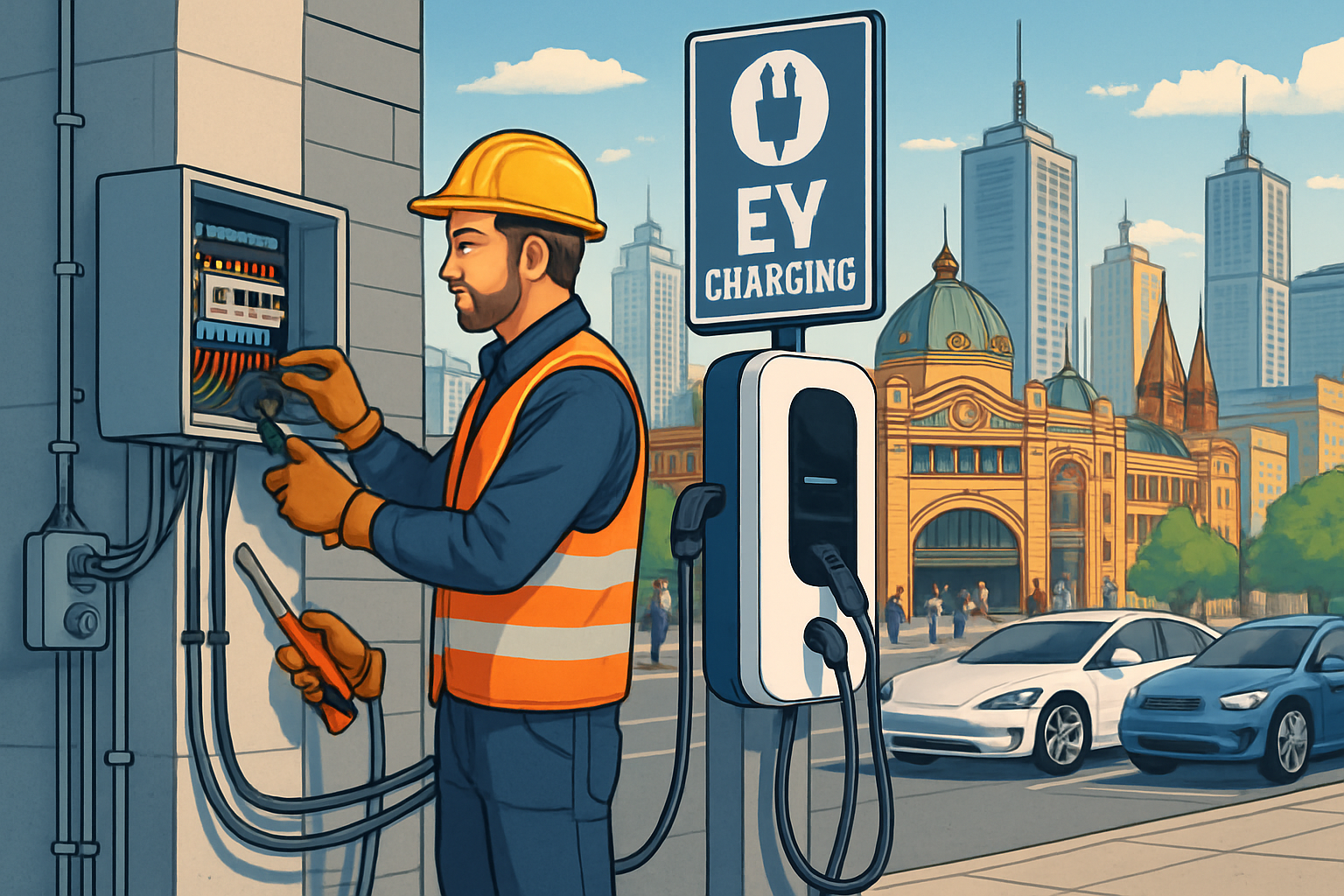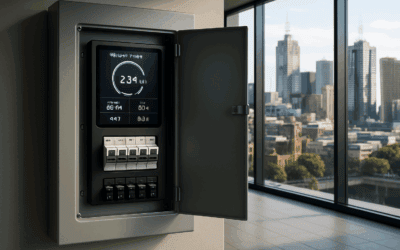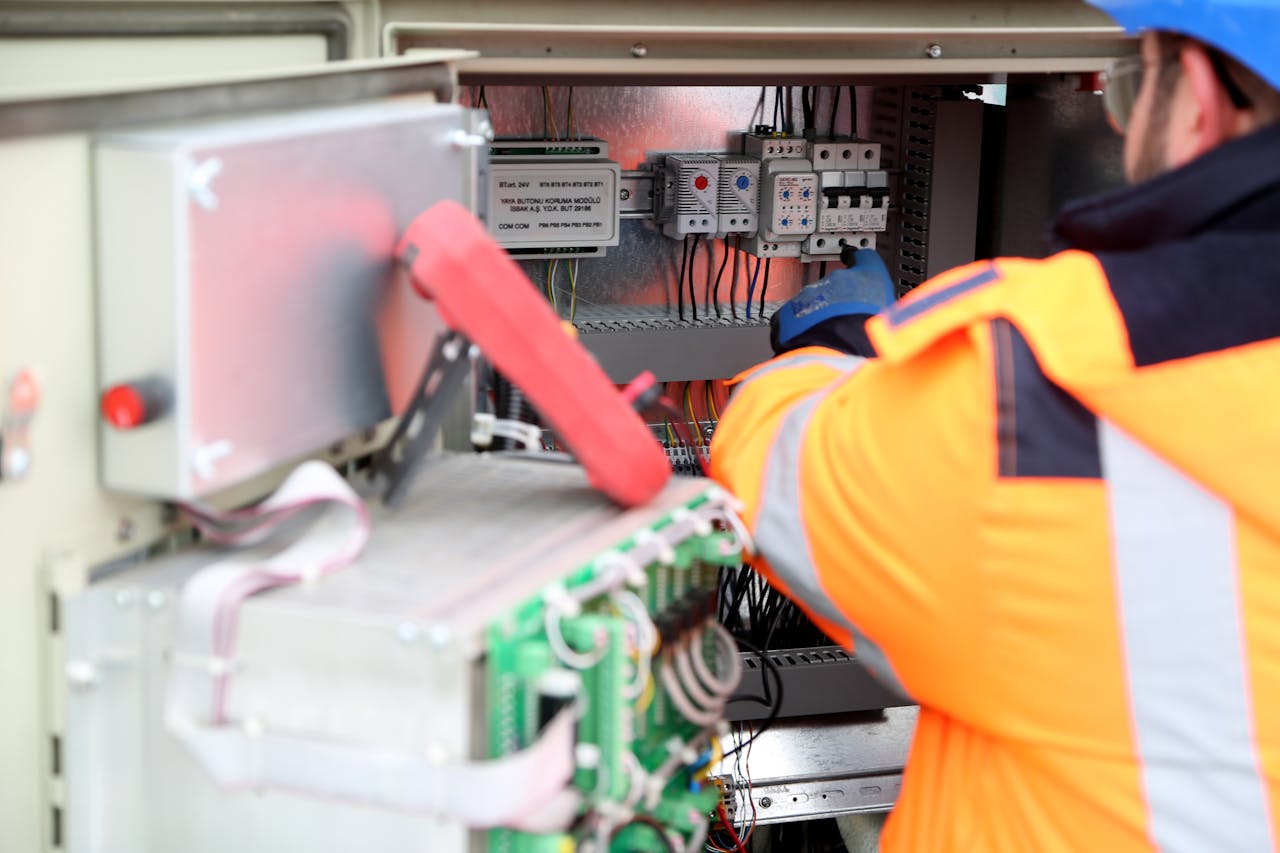- Introduction: Why EV Charging Matters for Your Business
- Understanding Commercial EV Charging Solutions
- Features and Benefits of Commercial EV Charging Stations
- How to Find a Commercial EV Charging Station Electrician in Melbourne
- Preparing for Your EV Charging Station Installation
- Local Regulations and Best Practices in Melbourne
- Practical Tips for a Smooth Installation Process
- Looking to the Future: EV Infrastructure and Business Growth in Melbourne
- Conclusion
Electric vehicles (EVs) are no longer the future; they’re the present, and businesses in Melbourne are feeling the charge. As a small business owner, you may be wondering how integrating EV charging stations into your commercial property can boost your business while meeting evolving customer and environmental demands. In this comprehensive guide, we’ll explore everything you need to know about commercial EV charging station installation in Melbourne—from understanding the technology to finding the right licensed EV electrician for your project.
In this article, we’ll cover:
- An introduction to why EV charging stations are key for businesses today
- In-depth information about installing and maintaining EV charging infrastructure
- Features and benefits of different EV charging solutions for commercial settings
- Practical tips on finding the perfect commercial EVSE installer and preparing your site
- Detailed local information on best practices, Australian standards, regulations, and codes specific to Melbourne
Read on to empower your business with a modern upgrade that attracts eco-conscious customers, supports green business practices, and future-proofs your property.
Introduction: Why EV Charging Matters for Your Business
The rapid spread of electric vehicles means that businesses across Melbourne have a golden opportunity to attract made-for-the-future customers. Adding EV charging points on your premises can create a competitive advantage in a couple of ways:
- Attract and Retain Customers: Customers appreciate businesses that make it easy to charge their EVs. This service encourages longer visits and can even draw in new clientele.
- Enhance Corporate Image: Embracing sustainability positions your business as forward-thinking and environmentally responsible.
- Stay Ahead with Compliance: With Australian standards and local regulations evolving rapidly, early adoption can keep you ahead of potential future mandates.
- Employee Benefits: Provide a green perk for staff, encouraging staff retention and satisfaction, and even supporting a shift towards an environmentally friendly workplace.
Melbourne’s growing reputation as a hub for innovation means that investing in EV charging infrastructure isn’t just about meeting today’s needs—it’s about preparing for tomorrow’s opportunities.
Understanding Commercial EV Charging Solutions
Types of EV Chargers
When planning your installation, it’s important to choose the right type of charger for your commercial property. Here’s a rundown of the most common EV charging solutions:
- Level 2 EV Chargers: These chargers are perfect for commercial properties, providing a good balance between charging speed and installation complexity. Level 2 chargers are often the go-to for shopping centres, workplaces, and multi-use developments.
- Fast Charging Stations: Often used by fast charging station contractors, these installations are designed for quick top-ups. DC fast charging, though more expensive to install, significantly reduces charging times and is ideal for high-traffic locations.
- 3-Phase EV Charging: Whether you are looking at 3-phase EV charging for larger installations, these systems are engineered for higher power outputs and can charge multiple vehicles simultaneously—a crucial factor for fleet operators and busy car parks.
- Smart EV Charging Systems: Integrated with networked charging solutions and energy management software, smart charging systems facilitate load balancing and can even interact with building management system integration, ensuring efficient use of energy resources.
Each charger type has its own set of features and benefits, and the right selection depends on your business model, expected usage patterns, and property infrastructure.
Key Components of a Commercial EV Charging Installation
- Charging Stations/Connectors: The hardware itself, which can include brand-specific designs like Tesla charger installations or more generic electric car charging points.
- Electrical Supply and Upgrades: Understanding your building’s electrical capacity for EV stations is fundamental. You may require an upgrade or load management systems to handle the increased demands.
- Control and Communication Units: Components like RFID charging solutions or OCPP compliant charging software ensure that your system is secure and manageable.
- Safety Equipment and Circuit Protection: Certified EV charging technicians ensure that installation adheres to electrical safety guidelines and provides circuit protection to prevent overload.
- Networking and Integration: Advanced solutions include integration with building management systems, allowing remote monitoring and automated load balancing for optimized performance.
Features and Benefits of Commercial EV Charging Stations
Implementing a commercial EV charging station comes with many benefits. Here’s a detailed look at the features and how they translate into benefits for your business:
1. Attract More Customers
- Feature: Presence of modern Level 2 and fast chargers.
- Benefit: Stand out in places like shopping centres, car parks, and commercial properties. A well-equipped charging station can become a drawcard for EV drivers looking for a convenient spot to recharge while shopping or working.
2. Boost Employee Satisfaction
- Feature: Workplace EV charging installations.
- Benefit: Provide a useful, on-site amenity to your staff, making your company more attractive to current and prospective employees who drive electric vehicles.
3. Enhance Environmental Credentials
- Feature: Integration of energy management systems and solar-integrated EV charging.
- Benefit: Demonstrate your commitment to environmental responsibility and sustainability. This not only improves your public image but can also attract government grants or incentives for green businesses.
4. Increase Revenue Opportunities
- Feature: Commercial EV charging solutions come with flexible billing options; options like RFID charging solutions improve user experience.
- Benefit: Generate additional income by charging EV drivers a fee for using the charging station, and enjoy the possibility of partnering with local authorities or green initiatives.
5. Future-Proof Your Business
- Feature: Compliance with Australian standards EV installation and ongoing maintenance by certified electricians.
- Benefit: Remain compliant with evolving regulations and ensure that your infrastructure is scalable for future technological advancements.
6. Operational Efficiency
- Feature: EV load management systems that balance power usage.
- Benefit: Reduces the risk of electrical overload and eliminates the need for costly upgrades by optimizing your existing electrical capacity for EV stations.
How to Find a Commercial EV Charging Station Electrician in Melbourne
Finding the right electrician for EV charging installation is crucial to ensure both safety and efficiency. Here’s how you can locate a commercial EV charging station electrician in Melbourne who is both experienced and reliable:
Research and Referrals
- Local Directories and Reviews: Start by searching online directories specifically for licensed EV electricians in Melbourne. Websites like Yellow Pages, local business directories, and even Google My Business listings can provide valuable insights and customer reviews.
- Ask for Referrals: If you know other business owners who have installed EV charging stations, ask for recommendations. A referral from someone who has undergone a similar installation can lead you to certified EV charging technicians who understand the local regulations.
- Check Memberships and Certifications: Look for electricians who are members of professional bodies or hold certifications in commercial EV charging solutions. This can include certifications for commercial charger electrical design and electrical certification for EV work.
Questions to Ask Potential Electricians
- How many commercial EV charging installations have they handled?
- Are they familiar with Melbourne’s local electrical certifications and codes specific to EV installations?
- Can they provide references or case studies from previous installations?
- Do they offer ongoing maintenance services for installed charging stations, ensuring compliance with Australian standards?
Evaluating Their Tools and Technologies
Before finalizing a contractor, ensure they use the latest equipment and technology for installation. Look for electricians who are familiar with:
- OCPP compliant charging systems
- Smart EV charging systems that support remote monitoring
- Load management technologies to regulate the power demands on your system
Preparing for Your EV Charging Station Installation
Conducting a Site Assessment
The first practical step in installing an EV charging station is conducting a thorough site assessment. This helps determine your property’s readiness and guides the installation process. Key aspects include:
- Electrical Infrastructure Check: Have a licensed electrician assess your current electrical capacity and determine if upgrades are needed. This includes verifying the power requirements for EV stations and ensuring compatibility with your existing electrical panels.
- Space and Layout Considerations: Identify the optimal location for the charging stations. Consider proximity to parking spaces, ease of access, and safety for both vehicles and pedestrians. It’s essential to have enough space not just for the charger but for the cable routing and any potential future expansions.
- Compliance with Local Regulations: Ensure your site assessment takes into account Melbourne’s local building codes, zoning laws, and any specific requirements for EV charging installations. Areas such as public car parks or shopping centres may have additional regulations to follow.
Budgeting and Funding
Planning an installation also requires clear budgeting. Consider these factors:
- Initial Installation Costs: The cost for a basic Level 2 EV charger installation can vary based on the complexity of the work. More advanced setups like fast charging systems or 3-phase EV chargers will typically require a higher upfront investment.
- Upgrades and Future Proofing: Factor in any electrical capacity upgrades, load management systems, or smart charging integrations. While these might increase initial costs, they ensure that your setup remains adaptable for future growth.
- Grants and Incentives: Research government grants or local Melbourne incentives aimed at promoting green infrastructure. Some local councils or state programs may offer financial support for businesses investing in sustainable energy solutions.
Timeline and Installation Planning
A clear timeline and plan ensure your project stays on track:
- Initial Consultation and Planning Stage: Schedule a meeting with your chosen EV electrician to assess your site and discuss your needs. This typically includes a site assessment, design proposals, and preliminary planning.
- Execution Phase: Once planning is complete, coordinate with your contractor on scheduling the installation. This phase might also involve temporary arrangements if your business operations need adjustments to accommodate installation work.
- Post-Installation Check: After installation, perform final inspections to ensure all systems are operational and compliant with local codes. This includes checking that the charging station electrical requirements are met and that the integrated smart systems are functioning correctly.
Local Regulations and Best Practices in Melbourne
Melbourne’s vibrant electrical infrastructure and focus on green technology mean that commercial EV charging installation must adhere to stringent local standards. Understanding these regulations not only keeps you compliant but also ensures the highest level of safety and operational efficiency. Here are some key points:
Australian Standards and Electrical Codes
- Compliance with Australian Standards: Installation and maintenance of EV charging stations must adhere to the latest Australian Standards EV installation guidelines. This includes standards for electrical safety, wiring, and the installation of charging equipment procured for commercial settings.
- Electrical Certification Requirements: All installations must be performed by licensed professionals with up-to-date certifications. In Melbourne, this ensures that every technician handling EV charger electrical work is well-versed in commercial EV charging solutions and follows strict safety protocols.
- Ongoing Maintenance and Inspections: Regular inspections and maintenance are a must. This not only extends the lifespan of your installations but also ensures that any compromised infrastructure, such as outdated load management systems, gets promptly upgraded. Regular check-ups can help avoid potential disruptions, especially during peak usage times.
Best Practices for Safety and Efficiency
- Site Safety Planning: Ensure that the installation site is clearly marked, and safety barriers are in place. Adequate signage for users, including instructions and emergency contacts, can make all the difference in ensuring smooth operation.
- Regular Maintenance Schedules: Establish a maintenance plan with your EV charging service provider. This includes routine checks for circuit protection, OCPP compliance, and testing of load balancing systems. A well-maintained system helps in preventing downtime and guarantees EV charging electrical safety.
- Energy Management Integration: Consider integrating your charging stations with an energy management system. This not only optimizes power requirements for EV stations but also assists with energy load management for EV charging. It’s a smart move if your facility is also looking into solar-integrated EV charging or other renewable energy sources.
- User-Friendly Billing and Management: Modern installations benefit from networked charging solutions that allow for seamless billing and monitoring. By incorporating RFID charging solutions and smart payment systems, you can streamline operations and provide a frictionless user experience.
Keeping Up with Melbourne’s Charging Network
Melbourne is rapidly expanding its EV infrastructure, and being part of this growing network can be advantageous:
- Collaboration with Local Authorities: Engage with your local council and Melbourne EV infrastructure teams. These organizations can offer guidance, support, and sometimes even funding opportunities for businesses installing EV charging stations.
- Stay Informed on Emerging Trends: The world of commercial EV charging is evolving. Stay connected with local industry groups, trade shows, and seminars focused on EV charging station electrical upgrades and innovations. This network will help you keep pace with technological advancements and regulatory changes.
Practical Tips for a Smooth Installation Process
Installing an EV charging station can seem daunting, but with careful planning and the right partner, it can be an efficient and rewarding upgrade. Here are practical tips to ensure you get it right the first time:
1. Define Your Charging Needs
Before contacting potential contractors, assess your business and customer needs thoroughly:
- Estimate the number and type of EV chargers you need (i.e., Level 2 vs. fast charging).
- Evaluate peak usage hours and safety requirements—do you require a multi-vehicle charging system, or is a single charger sufficient for your expected traffic?
- Consider future expansion. Planning for scalable EV infrastructure now can save you additional costs later.
2. Choose the Right Location
A strategic location is key for ensuring accessibility and utility:
- Pick a spot that’s easily accessible for vehicles, and ensure there’s ample space for cable routing, user safety and any future upgrades.
- Ensure the location is safe for both users and your property. Incorporate clear signage and protective barriers if needed.
3. Work with Licensed Professionals
When it comes to electrical work, there’s no room for shortcuts:
- Always work with certified EV charging technicians who understand the local codes and regulations.
- Verify that your chosen electrician is experienced in commercial EV charging solutions, including conducting thorough charging station site assessments and ensuring electrical work complies with Australian standards.
4. Plan for Disruptions
Even with the best planning, installation can sometimes disrupt normal business operations:
- Schedule installation during low-traffic periods or off-peak hours to minimize inconvenience.
- Have contingency plans in place if the installation schedule needs to shift due to unforeseen issues.
5. Budget for Ongoing Maintenance
Installation is just the beginning. Long-term efficiency and safety depend on proactive maintenance:
- Establish a service contract with your EVSE installer to conduct regular safety checks, firmware updates for smart EV charging systems, and immediate fixes for any discovered faults.
- An ongoing maintenance schedule can mitigate any risk of system failure and keep your charging station in top condition.
6. Embrace Feedback and Adapt
After installation, remain open to feedback from charging station users—invaluable for future upgrades or modifications:
- Encourage users to provide insights on system functionality, accessibility, and billing processes.
- Use this feedback to fine-tune the system, whether that means integrating additional features like rapid DC charging installation or adjusting load management strategies.
Looking to the Future: EV Infrastructure and Business Growth in Melbourne
As electric vehicles continue to gain traction, the demand for robust EV infrastructure in Melbourne will only increase. By investing in commercial EV charging stations now, you’re not only addressing a current need but also setting your business up for future growth. Consider these points as part of your long-term planning:
- Technological Advancements: As technology evolves, expect to see new systems such as enhanced smart EV charging networks and energy management solutions. Keeping your system upgradeable is essential.
- Growing EV Adoption: With widespread EV adoption, the need for charging stations in commercial areas like shopping centres, workplaces, and car parks will jump. Your early adoption can give you a significant competitive edge.
- Sustainability Incentives: Local governments and industry bodies are likely to introduce further incentives for businesses that adopt green infrastructure. This might include tax breaks, rebates, or preferential contracting with local councils.
- Integration with Renewable Energy: Future-proof your installation by considering renewable energy integration. For instance, coupling your EV charging station with solar systems not only reduces operating costs but also enhances your company’s commitment to sustainability.
Conclusion
Investing in a commercial EV charging station installation in Melbourne is a decision that drives customer satisfaction, supports environmental sustainability, and positions your business at the forefront of a technological revolution. From understanding the various types of chargers (be it Level 2 EV chargers, 3-phase charging systems, or fast charging installations) to ensuring compliance with Australian standards and local regulations, there’s a lot to consider. The benefits, however, are well worth the effort.
Taking the time to choose a licensed, experienced electrician who is knowledgeable about Melbourne’s specific EV infrastructure requirements can make all the difference. With careful planning, clear budgeting, and a forward-looking approach, you can create a charging solution that not only meets today’s needs but also serves as a foundation for future business growth.
As Melbourne continues to evolve into a smarter, greener city, ensuring your property can support electric vehicle charging is not just a trend—it’s an investment in the future. So, whether you’re planning for a few charging points at your business or a larger, multi-vehicle installation, remember that every step taken towards enhancing your EV infrastructure is a step towards a brighter, cleaner, and more connected future.
If you’re ready to explore commercial EV charging solutions further or have any questions about the installation process, don’t hesitate to reach out to local experts who can guide you through every step of the journey.
Embrace the change, future-proof your business, and join Melbourne in driving a sustainable, innovative future—one charging station at a time.
By following the guidelines and practical tips outlined in this article, you’ll be well on your way to successfully integrating an EV charging station that meets the demands of today and paves the way for tomorrow. Happy charging!




0 Comments